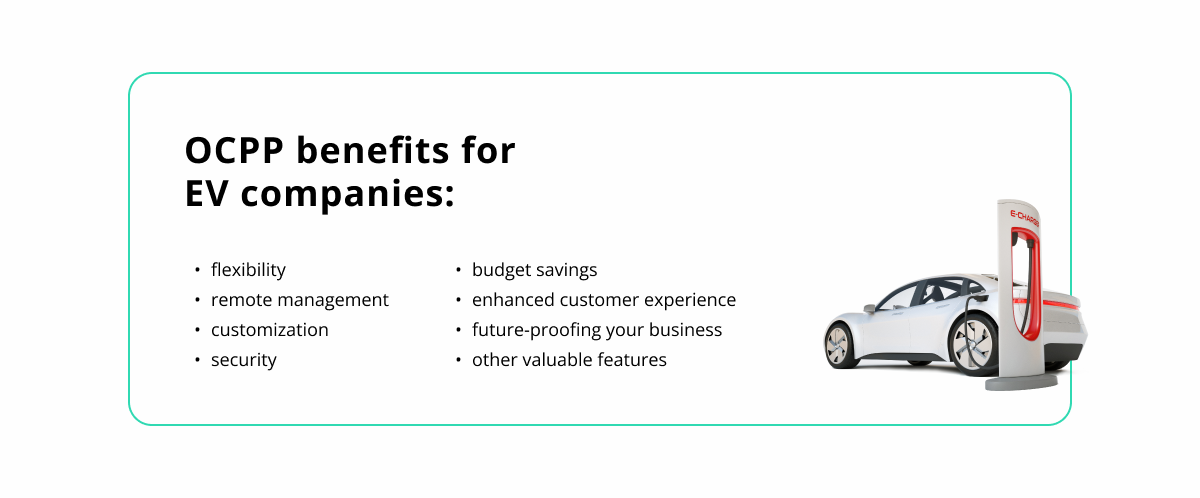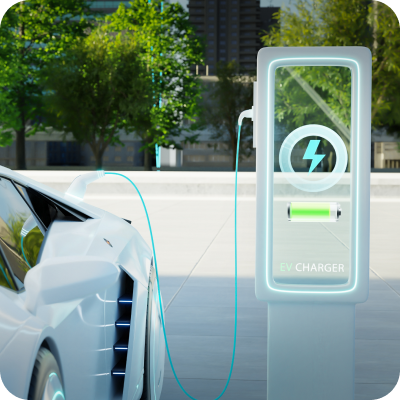OCPP: An Introduction to Open Charge Point Protocol for Emobility Professionals

The EV industry is booming, with the number of electric vehicles but also EV charging networks growing every month. It could grow even faster, if not for one major issue – too many proprietary communication protocols EV businesses use. EV charging stations or manufacturers typically notice the problem once they want to upgrade their infrastructure and find out that replacing a device or software they are using is far more demanding than they initially thought.
The modern charging station management system will only work with specific types of chargers. The new equipment doesn’t support the management or operating system used at the factory. What now? Pick the hardware or software that will work with the existing infrastructure, even if it doesn’t exactly meet their current business needs?
There’s a better option – implementing Open Charge Point Protocol for seamless communication between your hardware and software systems. How exactly this protocol world and can it really make the lives of the EV businesses easier? Here’s everything you need to know about it – from the main benefits to technical details.
What is OCPP?
The Open Charge Point Protocol, or OCPP is an open-source, free communication protocol that enables various EV charging equipment and central management platforms to exchange data between themselves. It might sound simple, but for the EV world, this is truly a revolution as thanks to it, EV businesses no longer need to worry about vendor-lock or hardware compatibility issues.
Imagine that you run a manufacturing company that has clearly outgrown the central management system you are using. There are dozens of management systems dedicated to the EV industry nowadays, so finding the one that will match your business’s new requirements shouldn’t be anything difficult?
After you compare the platforms though, you find out that implementing most of them would also require a significant infrastructure update. There is one platform that supports all of the equipment you are using at the factory…but it’s missing crucial features.

That leaves you with two options:
- Pay for upgrading your infrastructure to fit the requirements of the central management systems
- Choose the weaker software that can be integrated with all of your hardware without additional upgrades.
Neither is ideal.
Open Charge Point Protocol brings a third option to the table – pick any OCPP-compliant hardware and software you need and then connect it with the rest of your equipment via the protocol.
Even better, the hardware can all come from different manufacturers – as long as they use the OCPP standard for communication, they can easily exchange data between themselves.
How can OCPP standard benefit EV companies?
This flexibility is one of the things that makes the Open Charge Point Protocol standard so revolutionary. With it, EV charging stations now have full control over their charging infrastructure, as they can add, remove, replace, or swap software or equipment whenever they want – and only use the best products for their needs.
EV software vendors, network providers and hardware manufacturers can also benefit significantly from this flexibility. As their management systems and chargers now work with a broader range of charging stations and infrastructure, they can reach several times more businesses with their products – so their revenue will get a boost.

But implementing this protocol has many more benefits than just making it easier for CPOs to upgrade their infrastructure and for manufacturers to sell their products. Here’s what else you, as the business owner, can gain:
- Remote management: A massive benefit of the OCPP standard is that you can manage your entire infrastructure remotely. For example, you can monitor the energy consumption of your ev chargers, start and stop sessions or run diagnostics and maintenance of your charging equipment. Starting from version 2.01, you can also remotely manage the devices connected to your network.
- Customization: Do you need any specific features that are not yet available with the current version of the protocol? That’s not a problem – OCPP’s source code is available to everyone so it can be customized to fit your needs. Whether you need it to support additional payment options or send messages whenever your chargers are fully occupied, you can tailor the source code as you need it.
- Several valuable features: OCPI also comes packed with helpful features that can help you run your EV business more efficiently. The charging session authorization feature can automatically verify a customer and start the charging session. After the charging is finished, the billing information will be sent from the chargers to the back-end system so the system can bill the customer accordingly. The protocol also includes equipment issue recognition and alerting, charger reservation, and real-time station status monitoring.
- Security: To ensure the data passing between the system is protected, OCPP has numerous security features such as security profiles, automatic customer authentication, and security events. Starting from version 2.01, the data exchanged between the end-points is also secured with Transport Layer Security (TLS) encryption.
- Budget savings: OCPP can also help your company save money in a few ways. Energy management features will allow you to monitor how much energy your station or factory is using and then react to any issues straight away. With remote equipment monitoring meanwhile, you can spend less time and money on manual diagnostics and maintenance. Saving money on vendor contracts and integrating the new software or hardware into your proprietary network is icing on the cake.
- Enhanced customer experience: Besides the EV businesses, electric vehicle drivers can benefit quite a bit from the implementation of OCPP as well. For example, with the protocol’s help, charging station owners can offer their customers a range of payment options so the customers can use the one that’s most convenient to them. Using the real-time station usage data, CPO owners can also predict when their stations will be used most often and when there will be barely any traffic and then tailor their pricing accordingly. A good idea here could be, for example, to create unique charging plans for the time when the station is used the least.
- Future-proofing your business: Last but not least – with OCPP standard installed you can also ensure that your infrastructure stays compatible with new technology and standards, as the main firmware is regularly updated. The newer releases also come with support for the latest EV technologies. For example, with version 2.01, OCPP now supports the ISO 15118 standard, through which businesses can take full advantage of the Vehicle-to-Grid technology. EV drivers, meanwhile can enjoy the convenience of being able to authorize themselves just by connecting their car to a charger via the Plug&Charge technology.
OCPP 1.6 and 2.01 – how are they different?
Open Charge Point Protocol was first created in 2009 by E-Laad (now ElaadNL) foundation as a way to solve the connectivity issues between the Dutch Charging Stations (CS) and Charging Station Management Systems (CSMS).
Now, 13 years later, the Open Charge Point Protocol is used not only in the Netherlands but worldwide and is now seen as one of the major industry standards – ChargePoint, EvoCharge, Wallbox or IoTecha are among the major EV companies that have already adopted OCPP protocols.
As you can see on the Opencharge alliance website, the number of EV-centered companies that have opted to implement either OCPP 1.6 or 2.01 is also getting longer.
What is the difference between the two major versions available (1.6 and 2.01) though? Let’s take a closer look at both versions.

Open Charge Point Protocol 1.6
OCPP 1.6 is the most widely used version of the standard nowadays. Even though it was released in 2015, it still has more than enough features to handle most charging station management needs. Open Charge Alliance is also regularly updating the protocol and releasing new firmware version to the public.
What OCPP 1.6 has to offer?
- Smart charging (to allow business owners to monitor, limit and optimize their energy usage)
- Implementation via SOAP (Simple Object Access Protocol) and JSON (JavaScript Object Notation), compared to version 1.5, which only supported the former.
- New profiles (Smart charging, Reservation, Remote Trigger, Local Auth List Management, Firmware management, Security)
- Better diagnostic tools
- OCPP compliance testing tool
Open Charge Point Protocol 2.01
OCPP 2.01. is the latest version of the protocol, with the newest update released in December 2022. This version brings fixes for some issues found in version 2.0, but also introduces several new features for the users.
What OCPP 2.01 has to offer?
- Device management
- Improved transaction handling (especially useful for stations handling large amounts of transactions every day)
- Improved Smart Charging capabilities
- Added security features (TLS encryption, secure firmware updates, key management)
- Several authorization modes (Plug & Charge, payment terminals, local mechanical key, smartphones, etc.)
- Support for ISO 15118 protocol (enabling Plug&Charge and Vehicle-to-grid technology)
Implementation of the 2.01 version in the industry still goes quite slowly though, mainly because OCPP 2.01 is not backward compatible with the earlier version, 1.6 – the protocol architecture and messaging modules are entirely different.
This is one of the main reasons businesses relying on the 1.6 version of the protocol plan to upgrade to the most recent version in the near future.
At Codibly, we are also mainly working with clients who want OCPP version 1.6 implemented – that’s why we created an OCPP microservice for this version. If you do want to migrate from version 1.6 to 2.01, though, that’s something we can help with as well.
You can reach out to us with any OCPP-related questions or needs, and we’ll be happy to share our knowledge and skills on how to get the most out of the protocol.
Conclusion
Closed charging station networks and vendor-locked equipment may soon be a thing of the past thanks to ElaadNL and Open Charge Alliance. With Open Charge Point Protocol, charging station owners can freely mix and match their equipment and software to their main needs, while manufacturers can sell their platforms or hardware to a much wider group of customers.
Add to that the benefits OCPP can bring to the electric vehicle owners, and it’s clear that Open Protocols are the future of the EV industry. So why not take advantage of the protocol powers as well?
contact us
Need expert guidance on your next energy project?
Reach out to us and discover how Codibly can offer tailored solutions to drive your business.